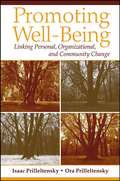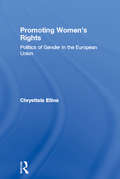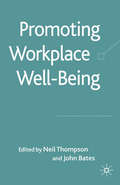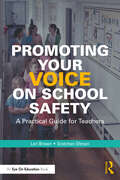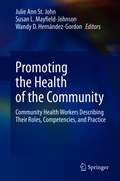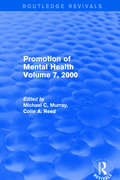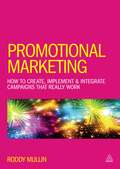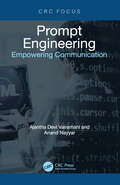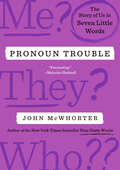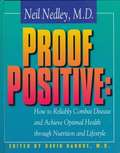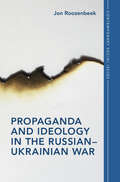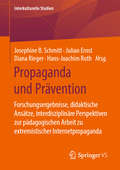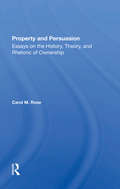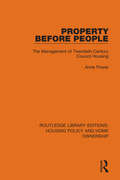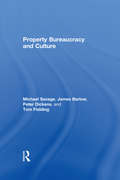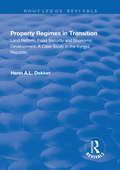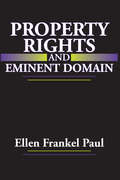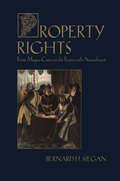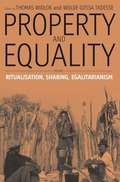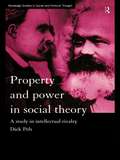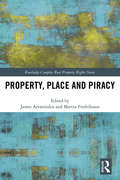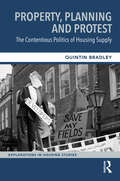- Table View
- List View
Promoting Well-being: Linking Personal, Organizational, and Community Change
by Isaac Prilleltensky Ora PrilleltenskyThe only book that links psychological wellness with organizational and community health, Promoting Well-Being provides you with important insight into how these domains interact as well as strategies for helping clients harness the benefits of these interactions. It is an essential tool for psychologists, counselors, social workers, human service professionals, public health professionals, and students in these fields.
Promoting Women's Rights: Politics of Gender in the European Union
by Chrysttala EllinaThis dissertation examines the impact of international institutions on women's rights policies by focusing on the European Union (EU) as a case study in order to illustrate the influence and the ways in which international factors affect women's right as a global policy concern. The principle proposition of this study is that beyond states, institutions are autonomous agents that influence policy outcomes often against member states' preferences.
Promoting Workplace Well-Being
by John Bates Neil ThompsonBringing together contributors from a wide range of disciplines, countries and perspectives this book provides a thought-provoking overview of the human dimension of the workplace. It covers workplace problems as well as potential solutions. Essential reading for anyone committed to making the workplace a humane and effective place.
Promoting Your Voice on School Safety: A Practical Guide for Teachers
by Lori Brown Gretchen OltmanThis hands-on guide helps teachers understand the complexity and humanity behind school safety and security issues—and their role in promoting, using their professional knowledge and expertise, a safe school environment. While other books teach security techniques (lockdowns and drills), this unique resource focuses on acknowledging a teacher’s role at the forefront of maintaining safe schools, as they spend the most time with students throughout the day. The book offers comfort and resources to these teachers on the front lines, with comprehensive guidance on how to identify, advocate for, and collaborate on school safety issues. It also provides invaluable information on classroom management, responding to trauma, striving for more equitable outcomes, and finding and using other voices. Each chapter is filled with reflection questions, tools, and "What would you do?" scenarios, making this the perfect resource to work on with a colleague or study group. With the practical advice in this book, you’ll feel more prepared and confident to tackle difficult decisions on both a small and larger scale. .
Promoting the Health of the Community: Community Health Workers Describing Their Roles, Competencies, and Practice
by Julie Ann St. John Susan L. Mayfield-Johnson Wandy D. Hernández-GordonCommunity health workers (CHWs) are an increasingly important member of the healthcare and public health professions who help build primary care capacity. Yet, in spite of the exponential growth of CHW interventions, CHW training programs, and CHW certification and credentialing by state agencies, a gap persists in the literature regarding current CHW roles and skills, scope of practice, CHW job settings, and national standards. This collection of contributions addresses this gap by providing information, in a single volume, about CHWs, the roles CHWs play as change agents in their communities, integration of CHWs into healthcare teams, and support and recognition of the CHW profession. The book supports the CHW definition as defined by the American Public Health Association (APHA), Community Health Worker Section (2013), which states, “A community health worker is a frontline public health worker who is a trusted member of and/or has an unusually close understanding of the community served.” The scope of the text follows the framework of the nationally recognized roles of CHWs that came out of a national consensus-building project called “The Community Health Worker (CHW) Core Consensus (C3) Project”. Topics explored among the chapters include:Cultural Mediation Among Individuals, Communities, and Health and Social Service SystemsCare Coordination, Case Management, and System NavigationAdvocating for Individuals and CommunitiesBuilding Individual and Community CapacityImplementing Individual and Community AssessmentsParticipating in Evaluation and ResearchUniting the Workforce: Building Capacity for a National Association of Community Health WorkersPromoting the Health of the Community is a must-have resource for CHWs, those interested in CHW scope of practice and/or certification/credentialing, anyone interested in becoming a CHW, policy-makers, CHW payer systems, CHW supervisors, CHW employers, CHW instructors/trainers, CHW advocates/supporters, and communities served by CHWs.
Promotion of Mental Health: Volume 7, 2000
by Michael C. Murray Colin A. ReedThis title was first published in 2001. Addressing a range of key theoretical and practical issues, this volume is the latest in an important series proceeding from the Annual Conference on the Promotion of Mental Health. It will be essential reading for policy makers, researchers and practitioners in the field.
Promotional Marketing
by Roddy MullinThe new edition of Promotional Marketing, formerly Sales Promotion (2010), details the tried-and-tested methods companies use to stay ahead of the competition, revealing the winning offers that gain new customers and keep existing ones happy. Updated throughout, Promotional Marketing also features the latest best practice advice for working in digital channels including web-based and mobile-based promotions. Packed with practical examples to aid learning the 60+ case studies covered analyse promotions from brands such as Sainsbury's; Sellotape; Discovery Foods; Listerine; Haagen-Dazs; Natwest; BT; Shell; Diageo; Cadbury's and Kleenex.Topics covered include: the purpose of promotional marketing; what promotional marketing can do for you; how to use different techniques, including joint promotions, price promotions and off-the-shelf promotions; how to implement an integrated market strategy; maintaining a crucial creative edge; the best ways to use suppliers; and evaluating your promotion.
Promotional Marketing: Second Edition
by Roddy MullinIn today’s connected world, promotion is fundamental to everything we do to drive business. This is a new edition of an established book, updated with the latest research on the shopper/buyer and how to reach their ‘tipping point’ when the decision to buy is made, now covering mobile, online and bricks-and-mortar sales and marketing. This book clarifies why a focus on the customer is key, and how to communicate with them from even before they discover a want or need, to the point of purchase and after. The author of this important book explains how and when to use suppliers (agencies, printers, insurers, etc.) for promotions of all types, including advertising (outdoor, on websites and in print), experiential marketing (road and trade shows, exhibitions, merchandising) and sales promotions (in-store/web and mobile promotion offers). Processes describe and explain how to implement promotional marketing to achieve business objectives. Promotional Marketing is a practitioner guide to sales and marketing for agencies, entrepreneurs and small businesses and those seeking a career in retail. It is packed with real-life and award-winning case studies and practical briefs (NatWest, Diageo, Sainsbury’s, Shell and Radisson, for example) as a starter for when the client needs a creative answer yesterday! It is also tuned to those studying, providing a chapter on how marketing and sales fit into business.
Promovieren nach Plan?
by Navina Roman Svea KorffDer Bologna-Prozess hat auch die Promotion erreicht: Mit der stärkeren Strukturierung der Promotionsphase bzw. einem "Promovieren nach Plan" ist nicht nur die Hoffnung verbunden, die Anzahl der Promotionen zu erhöhen, die Promotionszeiten zu verkürzen und damit den Wissenschaftsstandort Deutschland zu stärken, sondern es soll auch die Situation junger Nachwuchswissenschaftlerinnen verbessert bzw. für mehr Chancengleichheit sorgen. Wie aber die Promotionsphase "strukturiert" wird und welche Bedeutung dies für die Chancengleichheit hat, ist bisher kaum erforscht. Die vorliegende Untersuchung analysiert die strukturierte Promotionsförderung darum mit Hilfe eines mehrdimensionalen Untersuchungsdesigns: Durchgeführt wurden neben einer deutschlandweiten und fächerübergreifenden Online-Befragung von Promovierenden in Programmen strukturierter Promotion, eine Diskursanalyse, eine Bestandsaufnahme von Programmen strukturierter Promotion, sowie Gruppendiskussionen und ExpertInneninterviews. Dieses Vorgehen ermöglicht eine umfassende Perspektive auf das strukturierte Promovieren - unter besonderer Berücksichtigung von Gender- und Diversity-Aspekten - in Deutschland.
Prompt Engineering: Empowering Communication
by Anand Nayyar Ajantha Devi VairamaniPrompt engineering engages as a transformative approach to enhancing interaction, creativity, and innovation. From business and healthcare to education, law, and beyond, prompt engineering is a versatile toolkit for navigating complex challenges and driving meaningful change.This book delves into the intricacies of prompt engineering, providing insights, techniques, and practical examples for leveraging prompts effectively. It explores the evolution of prompt engineering, from its early antecedents to its contemporary applications with advanced language models like ChatGPT. Readers will discover how prompts can enhance communication, foster creativity, facilitate problem-solving, and empower professionals across diverse domains.This book is your gateway to unlocking the full potential of prompt engineering. Join the journey of discovery and innovation as the book harnesses the power of prompts to shape a brighter future.
Pronoun Trouble: The Story of Us in Seven Little Words
by John McWhorterWith his trademark humor and flair, bestselling linguist John McWhorter busts the myths and shares the history of the most controversial language topic of our times: pronounsThe nature of language is to shift and evolve—but every so often, a new usage creates a whole lot of consternation. These days, pronouns are throwing curveballs, and it matters, because pronoun habits die hard. If you need a refresher from eighth-grade English: Pronouns are short, used endlessly, and serve to point and direct, to orient us as to what is meant about who. Him, not her. Me, not you. Pronouns get a heavy workout, and as such, they become part of our hardwiring. To mess with our pronouns is to mess with us. But many of today&’s hot-button controversies are nonsense. The singular they has been with us since the 1400s and appears in Shakespeare&’s works. In fact, many of the supposedly iron-clad rules of grammar are up for debate (Billy and me went to the store is perfectly logical!), and with tasty trivia, unexpected twists, and the weird quirks of early and contemporary English, John McWhorter guides readers on a journey of how our whole collection of these little words emerged and has changed over time.
Proof Positive: How to Reliably Combat Disease and Achieve Optimal Health
by Neil NedleyA must for all wanting to use natural means for preventing or treating high blood pressure, blocked arteries, cancer, chronic fatigue, diabetes, osteoporosis, and many other afflictions. Provides information that minimizes the use of prescription drugs, diet fads, and their accompanying side effects. Highly illustrated in full color, this tome of information is designed to be readable and easy-to-understand. Singular case studies, which can be misleading, are not used. Instead, the results of a host of scientific studies conducted around the world are cited, many of which involve large groups of individuals with widely varying lifestyles. Many topics are covered such as how to strengthen the immune system, overcome addictions, increase reasoning ability, cope with stress, and enhance children's mental and physical potential.
Propaganda and Ideology in the Russian–Ukrainian War (Contemporary Social Issues Series)
by Jon RoozenbeekRussia's invasion of Ukraine is one of the most important conflicts of the twenty-first century. With the start of military hostilities in 2014 also came an onslaught of propaganda, to both convince and confuse audiences worldwide about the war's historical and ideological underpinnings. Based on extensive research drawing on tens of thousands of news articles and hundreds of pages of legal documents and internal correspondence, this book offers the first comprehensive analysis of the role of propaganda, ideology, and identity in the Russian-Ukrainian war. It argues that, despite Russia's efforts to set up a media machine at home and abroad with eight years of propaganda legitimising Russia's presence in eastern Ukraine, Russia failed to vocalise a convincing alternative to Ukrainian nationhood. Instead, Russian propaganda backfired: Ukraine is now more united than ever before.
Propaganda und Prävention: Forschungsergebnisse, didaktische Ansätze, interdisziplinäre Perspektiven zur pädagogischen Arbeit zu extremistischer Internetpropaganda (Interkulturelle Studien)
by Josephine B. Schmitt Julian Ernst Diana Rieger Hans-Joachim RothÜber Propaganda extremistischer Gruppierungen zu stolpern, ist für viele Jugendliche längst alltäglicher Bestandteil ihrer Mediennutzung – und damit gesellschaftliche wie pädagogische Herausforderung. Der Band versammelt tiefgehende Einblicke in theoretische und empirische Fragestellungen der pädagogischen Arbeit mit und über extremistische Internetpropaganda. Ein Schwerpunkt liegt auf Ergebnissen des durch die Europäische Kommission geförderten Forschungsprojekts CONTRA. Zudem versammelt der Band eine Vielzahl weiterer Perspektiven auf das Phänomen extremistischer Propaganda und deren pädagogische Implikationen aus Wissenschaft und Praxis.
Property And Persuasion: Essays On The History, Theory, And Rhetoric Of Ownership
by Carol M RoseWith socialism largely discredited in recent years, the moral and legal status of private property has become an increasingly important area for discussion in contemporary political and social thought. Offering a contribution to legal theory, and to political and social philosophy, this work examines the two currently dominant traditions - those of neo-conservative utilitarianism and liberal communitarianism - emphasizing the strengths of both approaches and laying the groundwork for a theory to bridge the gap between them.
Property Before People: The Management of Twentieth-Century Council Housing
by Anne PowerOriginally published in 1987 and now re-issued with a new preface, this book examines attempts by successive individuals and governments to overcome slum conditions and homelessness, to reform landlord-tenant relations and to provide sound modern dwellings with full amenities for those who need them. Its focus is on how those responsible for public housing concentrated their energies on buildings rather than management, on property rather than people, in sharp distinction to the women who played such an innovative and humanizing role in the early days of housing reform. Efforts to resolve public housing problems are examined in a study of twenty housing estates, and of the initiatives that local authorities have taken to reverse the sometimes overwhelming decay.
Property Bureaucracy & Culture: Middle Class Formation In Contemporary Britain (International Library Of Sociology)
by Michael Savage James Barlow Peter Dickens Tom FieldingThis assured and powerful study explores the condition of the middle classes in Britain today. The authors outline a new theoretical perspective for exploring the middle classes and provide the reader with up-to-date empirical information on the class structure.
Property Regimes in Transition, Land Reform, Food Security and Economic Development: A Case Study in the Kyrguz Republic
by Henri A.L. DekkerThis title was first published in 2003. Many former communist republics strive to adopt a market economy in which the privatisation of landed property is a key element. Generally, it is expected that by doing so, economic development will take off, improving food security and decreasing rural poverty. The relationship between changing land regulations, economic development and poverty is complex and yet little understood. With land reform, governments in transitional economies expect to achieve economic growth and thus alleviation of rural poverty. Nowadays, there is ample research to prove that, to be effective, land policy reforms need to be complemented with institutional reforms, and rural development activities. It puts forward a model for rapid assessment of project progress in which macro-economic indicators are applied in a systematic way to give insight to concepts such as land tenure security and food security and to provide warning signals for less-desired developments as a result of project implementation.
Property Rights and Eminent Domain
by Ellen Frankel PaulIn a country built on the institution of private property, property-owner rights have been under attack. By arguing that private property is a fundamental liberty whose protection deserves the highest priority, Ellen Frankel Paul challenges one of the dominant trends of the past half century: the erosion of property rights via zoning and land use restrictions, carried on by government exercising its "police power" or promoting "the public interest." Paul begins by examining the arguments of environmentalists in support of land-use legislation, and explores a few particularly troubling examples of the exercise of eminent domain and police powers. She traces the philosophical arguments for the two powers as well as their tortuous judicial history, the meaning of property rights and investigates how previous thinkers have defended these rights is detailed, and Paul suggests a more adequate defense for them. In the concluding portion of the book, the very legitimacy of eminent domain is questioned and the author offers recommendations for its reform. This analysis is wide in scope and makes creative use of historical, legal, economic, and philosophic methodologies. It not only gives an account of the present power regulations on land, but also provides an exhaustive history of the development of the law in these two areas and of the philosophical ideas of the thinkers who helped shape this process. This book is distinctive because it places a theory of the just acquisition of property at the heart of the answer to the question of the extent to which governments can rightfully exercise the powers of eminent domain and police. "Amazingly, in a country built on the institution of private property, the right to property in land has been under increasing assault, and has seldom been defended. Paul's book--by arguing that private property is a fundamental liberty whose protection deserves the highest priority--is a major step toward filling the void."--Robert Hessen, Stanford University
Property Rights: From Magna Carta to the Fourteenth Amendment
by Bernard SieganProperty Rights: From Magna Carta to the Fourteenth Amendment breaks new ground in our understanding of the genesis of property rights in the United States. According to the standard interpretation, echoed by as lofty an authority as Supreme Court Justice Harry Blackmun, the courts did little in the way of protecting property rights in the early years of our nation. Not only does Siegan find this accepted teaching erroneous, but he finds post-Colonial jurisprudence to be firmly rooted in English common law and the writings of its most revered interpreters. Siegan conducts an exhaustive examination of property rights cases decided by state courts between the time of the ratification of the U.S. Constitution in 1788 and the adoption of the Fourteenth Amendment in 1868. This inventory, which in its sweep captures scores of cases overlooked by previous commentators on the history of property rights, reveals that the protection of these rights is neither a relatively new phenomenon nor a heritage with precarious pedigree. These court cases, as well as early state constitutions, consistently and repeatedly embraced key elements of a property rights jurisprudence, such as protection of the privileges and immunities of citizens, due process of law, equal protection under the law, and prohibitions on the taking of property without just compensation. Case law provides overwhelming evidence that the American legal system, from its inception, has held property rights and their protection in the highest regard.The American Revolution, Siegan reminds us, was fought largely to affirm and protect private property rights-that is, to uphold the "rights of Englishmen"-even if it meant that the colonists would cease being Englishmen. John Locke and other great theoreticians of property rights understood their importance, not only to individuals who happened to possess property, but to the preservation of a free society and to the prosperity of its inhabitants. Siegan's contribution to this venerable tradition lies in his faithful reconstruction of our legal history, which allows us to see just how central property rights have been to the American experiment in liberty-from the very beginning.
Property and Equality, Volume 1: Ritualisation, Sharing, Egalitarianism
by Thomas Widlok Wolde Gossa TadesseThe ethnography of egalitarian social systems was first met with sheer disbelief. Today it is still hotly debated in a number of fields and has gained sophistication as well as momentum. This collection of essays on "property and equality" acknowledges this diversification by presenting research results in two complementary volumes. They bring together a wide range of authoritative researchers most of whom have worked with hunter-gatherer groups. These two volumes cover existing ethnographic and theoretical ground while maintaining a clear focus on the relation between property and equality. The book consists of the most recent work of prominent members of the original group of researchers in hunter-gatherer studies among them James Woodburn and Richard Lee, and very recent ethnography on hunter-gatherers and other egalitarian systems.
Property and Power in Social Theory: A Study in Intellectual Rivalry (Routledge Studies in Social and Political Thought #No.15)
by Dick PelsProperty and power perform a key role in social and political theories of class inequality and social stratification, however, theorists have yet clearly to define these concepts, their mutual boundaries and scopes of application. This book answers the property/power puzzle by undertaking a broad historical inquiry into its intellectual origins and present-day effects through a series of case studies, including:Marxism vs. anarchism* the fascist assertion of the primacy of the political* social science as power theory* the managerial revolution* the knowledge society and the new intellectual classes
Property, Family and the Irish Welfare State
by Michelle NorrisThis book examines the long-term development of the Irish welfare state since the late 19th Century. It contests the consensus view that Ireland, like other Anglophone countries, has historically operated a liberal welfare regime which forces households to rely mainly on the market to maintain their standard of living. Drawing on case studies and key statistical data, this book argues that the Irish welfare state developed differently from most other Western European countries until recent decades. Norris' original line of argument makes the case that Ireland's regime was distinctive in terms of both focus and purpose in that Ireland's welfare state was shaped by the power of small farmers and moral teaching and intended to support a rural, agrarian and familist social order rather than an urban working class and industrialised economy. A well-researched and methodical study, this book will be of great interest to scholars of social policy, sociology, and Irish history.
Property, Place and Piracy (Routledge Complex Real Property Rights Series)
by Martin Fredriksson James ArvanitakisThis book takes the concept of piracy as a starting point to discuss the instability of property as a social construction and how this is spatially situated. Piracy is understood as acts and practices that emerge in zones where the construction and definition of property is ambiguous. Media piracy is a frequently used example where file-sharers and copyright holders argue whether culture and information is a common resource to be freely shared or property to be protected. This book highlights that this is not a dilemma unique to immaterial resources: concepts such as property, ownership and the rights of use are just as diffuse when it comes to spatial resources such as land, water, air or urban space. By structuring the book around this heterogeneous understanding of piracy as an analytical perspective, the editors and contributors advance a trans-disciplinary and multi-theoretical approach to place and property. In doing so, the book moves from theoretical discussions on commons and property to empirical cases concerning access to and appropriation of land, natural and cultural resources. The chapters cover areas such as maritime piracy, the philosophical and legal foundations of property rights, mining and land rights, biopiracy and traditional knowledge, indigenous rights, colonization of space, military expansionism and the enclosure of urban space. This book is essential reading for a variety of disciplines including indigenous studies, cultural studies, geography, political economy, law, environmental studies and all readers concerned with piracy and the ambiguity of property.
Property, Planning and Protest: The Contentious Politics of Housing Supply (Explorations in Housing Studies)
by Quintin BradleyThe struggle for the right to housing is a battle over property rights and land use. For housing to be provided as a human need, land must be recognised as a common right. Property, Planning and Protest is a compelling new investigation into public opposition to housing and real estate development. Its innovative materialist approach is grounded in the political economy of land value, and it recognises the conflict between communities and real estate capital as a struggle over land and property rights. Property, Planning and Protest is about a social movement struggling for democratic representation in land-use decisions. The amenity groups it describes champion a democratic plan-led system that allocates land for social and environmental goals. Situating this movement in a history of land reform and common rights, this book sets out a persuasive new vision of democratic planning and affordable housing for all.
